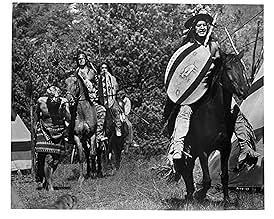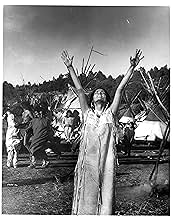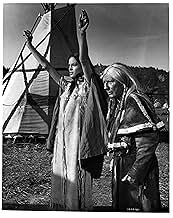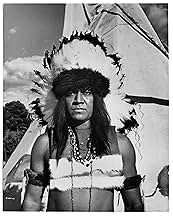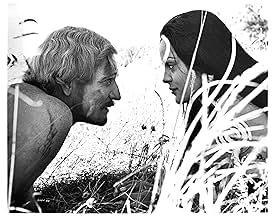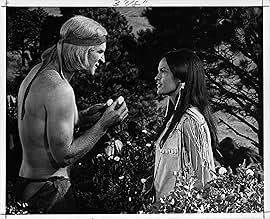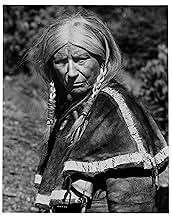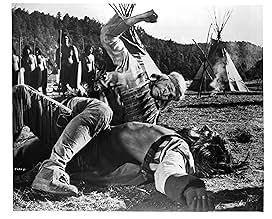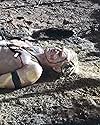CALIFICACIÓN DE IMDb
6.8/10
9.9 k
TU CALIFICACIÓN
En 1825, unos nativos americanos capturan a un aristócrata inglés. Convive con ellos y comienza a comprender su estilo de vida. Al final, lo aceptan como parte de la tribu y aspira a convert... Leer todoEn 1825, unos nativos americanos capturan a un aristócrata inglés. Convive con ellos y comienza a comprender su estilo de vida. Al final, lo aceptan como parte de la tribu y aspira a convertirse en su líder.En 1825, unos nativos americanos capturan a un aristócrata inglés. Convive con ellos y comienza a comprender su estilo de vida. Al final, lo aceptan como parte de la tribu y aspira a convertirse en su líder.
- Dirección
- Guionistas
- Elenco
- Premios
- 1 premio ganado y 2 nominaciones en total
Judith Anderson
- Buffalo Cow Head
- (as Dame Judith Anderson)
Lina Marín
- Thorn Rose
- (as Lina Marin)
- Dirección
- Guionistas
- Todo el elenco y el equipo
- Producción, taquilla y más en IMDbPro
Opiniones destacadas
at the beginning of this movie,there is a blurb about how the events portrayed are taken directly from historical documents of the period.the South Dakota Sioux Indians also had a lot of input into the movie.so,we can assume it is fairly accurate.one thing it does is show the Native American Indians as being just like any other people.this movie took awhile to get going,in my mind,but once it does,it's action packed,and it's very well acted.Richard Harris is the title character.he is a British Lord who is captured by the Sioux in the mid 1800's.first he is treated with disdain,as nothing more than a servant to the aging mother of the chief.gradually,though,things change,though,and he becomes much more.this is a very touching and heart breaking movie.it's also very thought provoking.overall,i give A Man Called Horse a 6/10
In 1825, the Sioux, leaded by Yellow Hand (Manu Tupou), capture the English nobleman John Morgan (Richard Harris), while hunting in the United States of America. John is brutally treated like an animal by the Indian, and is given to help Buffalo Cow Head (Judith Anderson), the mother of Yellow Hand, as if he were a horse. Without understanding the language and behavior of the Sioux, he is helped by Batise (Jean Gascon), a white man made prisoner and mutilated by the Indians five years ago. Batise translates and explains the Sioux's culture for John, plotting to escape some day back to the civilization with him. After an undefined long time later, John loses his snobbish behavior and is reasonably integrated to the Sioux. One day, he kills two enemies Shoshones, who were spying and stalking the Sioux, and gains the respect of the Sioux and love of the sister of Yellow Hand, Running Deer (Corinna Tsopei). John marries Running Deer and integrates to their culture, and after a tragic attack of the Shoshones to the Sioux tribe, he becomes their leader. "A Man Called Horse" is a spectacular and powerful classic western of the 70's. The first time I saw this movie, I was a teenager and left the theater completely astonished with such a different story in that time and the violence of the scenes. Two days ago, I bought the VHS and yesterday I saw it again, and it is still a very impressive film, with magnificent performances of the cast, highlighting Richard Harris and Judith Anderson. The production is very careful, being mostly spoken in Sioux, and depicting in a realistic way, the life, the behavior, the common laws and the moral practices of the Sioux. I believe that "A Man Called Horse", with the Sioux, "Soldier Blue", with the Cheyenne and "Little Big Man", all of them from 1970, were among the first movies to show the lives of prisoners of the North American Indians in their tribes. The amazing scene of John Morgan suspended by his chest in an Indian ceremony is unforgettable and very impressive. My vote is ten.
Title (Brazil): "Um Homem Chamado Cavalo" ("Spectacular Classic Western")
Title (Brazil): "Um Homem Chamado Cavalo" ("Spectacular Classic Western")
This is the story of Lord John Morgan, an honest earthy person who is captured by the Sioux in 1825. Abused and treated as an animal he comes to adapt to his life in order to survive. Enduring torture and oppression he must earn their respect in order to be accepted as part of their tribe.
The white man as part of a Sioux tribe story was given a major shot in the arm with Kevin Costner's Oscar bagger, Dances With Wolves in 1990. This picture came out some twenty years before Costner's stylish picture but the two films couldn't be further apart in terms of story telling. Here in Elliot Silverstein's picture, the scenery and scope is certainly lush, but the niceties stop there for this is a harsh, at times painful, story with realism dripping from each frame. Silverstein wanted to get as close as he could to the facts of the Sioux way of life, even bringing in a Sioux historian to oversee the production.
The Sioux are painted on both sides of the canvas, on one side we are shown them to be violent, even sadistic, but Silverstein also portrays them as an intelligent race driven on by intense loyalty to their ways and culture. Richard Harris plays our main protagonist and has a clear license to act with immense verve and vigour, it's a memorable turn that lingers long after the credits roll. Hurting the film is a twee romance between Morgan and the Chiefs daughter (Judith Anderson) and Jean Gascon's fluctuating accents start to grate entering the film's last quarter. But really the plus points far outweigh the little irritants in the piece. The editing from Philip W. Anderson & Michael Kahn is like a whirling paean to hallucinations, and some scenes are from the top draw, most notably the Vow To The Sun ritual that literally is painful to watch. A Man Called Horse may well be of its time, but it's certainly a very interesting and highly intelligent film. 7/10
The white man as part of a Sioux tribe story was given a major shot in the arm with Kevin Costner's Oscar bagger, Dances With Wolves in 1990. This picture came out some twenty years before Costner's stylish picture but the two films couldn't be further apart in terms of story telling. Here in Elliot Silverstein's picture, the scenery and scope is certainly lush, but the niceties stop there for this is a harsh, at times painful, story with realism dripping from each frame. Silverstein wanted to get as close as he could to the facts of the Sioux way of life, even bringing in a Sioux historian to oversee the production.
The Sioux are painted on both sides of the canvas, on one side we are shown them to be violent, even sadistic, but Silverstein also portrays them as an intelligent race driven on by intense loyalty to their ways and culture. Richard Harris plays our main protagonist and has a clear license to act with immense verve and vigour, it's a memorable turn that lingers long after the credits roll. Hurting the film is a twee romance between Morgan and the Chiefs daughter (Judith Anderson) and Jean Gascon's fluctuating accents start to grate entering the film's last quarter. But really the plus points far outweigh the little irritants in the piece. The editing from Philip W. Anderson & Michael Kahn is like a whirling paean to hallucinations, and some scenes are from the top draw, most notably the Vow To The Sun ritual that literally is painful to watch. A Man Called Horse may well be of its time, but it's certainly a very interesting and highly intelligent film. 7/10
This movie offered a different perspective of the Sioux, and although controversial, it is worth a view. Director Elliot Silverstein doesn't glamorize the Indians and he doesn't make them victims of white injustice. He just tells it like it is, and I have to admire him for it. Many activists protested what they believed to be inaccuracies; nonetheless, the film is the other side of "Dances With Wolves" (really, it's more like "Run of the Arrow"). For an in-depth interview with Silverstein and the making of "A Man Called Horse," read "Making the White Man's Indian: Native Americns and Hollywood Movies." It's a great behind-the-scenes read of this and other popular Western pictures.
I first saw this film in the theatre when it came out in 1970. It was a welcome departure from earlier films about pioneers sitting among their circled wagons shooting whooping Indians like ducks in an arcade.
I saw it last weekend for the first time since, and I think that it holds up well. Whatever the flaws, it is a reasonably good depiction of Dakota Sioux going about their business in the 1820s.
This movie demonstrates that a story can be told with very little dialog and a lot of non-verbal expression. Harris might be the most prominent character but, cumulatively, the cast of small characters weighs in just as heavy.
I saw it last weekend for the first time since, and I think that it holds up well. Whatever the flaws, it is a reasonably good depiction of Dakota Sioux going about their business in the 1820s.
This movie demonstrates that a story can be told with very little dialog and a lot of non-verbal expression. Harris might be the most prominent character but, cumulatively, the cast of small characters weighs in just as heavy.
¿Sabías que…?
- TriviaThe story is based on the experience of Cabeza de Vaca, a Spanish soldier captured by indigenous Americans in 1528.
- ErroresThroughout the film the actress playing Running Deer can be seen with medium long, nicely manicured fingernails.
- Versiones alternativasOld German VHS version includes many alternate/more violent takes that are not on the US DVD (whereas the version on the DVD is the same as in the US), especially the ending is almost completely recut. On the other hand the US version includes a few lines which are not in the German version.
- ConexionesEdited into Commercial Entertainment Product (1992)
Selecciones populares
Inicia sesión para calificar y agrega a la lista de videos para obtener recomendaciones personalizadas
- How long is A Man Called Horse?Con tecnología de Alexa
- What is 'A Man Called Horse' about?
- Is 'A Man Called Horse' based on a book?
- Is it true that this movie is entirely in Sioux?
Detalles
- Fecha de lanzamiento
- Países de origen
- Idiomas
- También se conoce como
- A Man Called Horse
- Locaciones de filmación
- Productoras
- Ver más créditos de la compañía en IMDbPro
Taquilla
- Total en EE. UU. y Canadá
- USD 1,941,247
- Total a nivel mundial
- USD 44,000,000
- Tiempo de ejecución1 hora 54 minutos
- Mezcla de sonido
- Relación de aspecto
- 2.35 : 1
Contribuir a esta página
Sugiere una edición o agrega el contenido que falta

Principales brechas de datos
What is the Italian language plot outline for Un hombre llamado Caballo (1970)?
Responda

